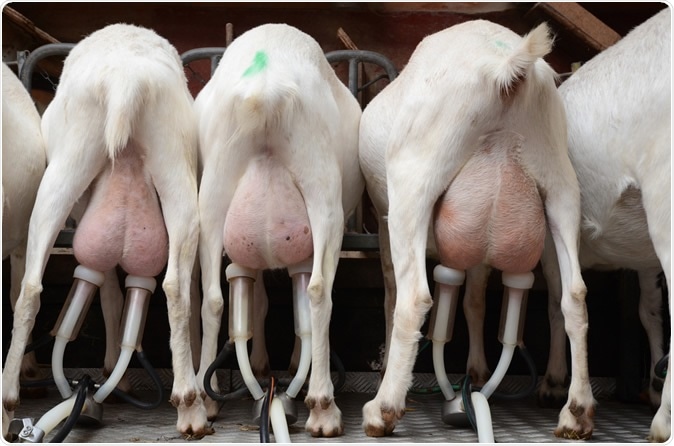Researchers from RMIT’s lab analyzed goat’s milk formula and looked at the oligosaccharides present in it. These simple sugars and the prebiotics present within the goat’s milk based infant formula have been found to help develop helpful or beneficial gut bacteria in the infant’s gut and protect them from harmful bacterial colonization in their intestines.

Goats being milked in a mechanised milking parlour. Image Credit: Takako Picture Lab / Shutterstock
The study results were published in the latest issue of the journal British Journal of Nutrition and titled, “Oligosaccharides in goats' milk-based infant formula and their prebiotic and anti-infection properties.” The study results were presented at the 2019 Annual Nutrition Conference of the American Society of Nutrition in Baltimore, USA.
The team writes that human milk is rich in a wide range of oligosaccharides that provide immense health benefits to the infants. One of these benefits includes development of the microbiome in the gut or healthy microbes in the intestines. This development is linked to development of a healthy immune system and also protection against gastrointestinal infections. Cow’s milk based formula is most commonly used for infants but it has been seen that goat’s milk is closer to humans than cow’s milk, write the researchers.
The team analyzed two commercially available goat’s milk formula preparations and found that these contain 14 naturally-occurring prebiotic oligosaccharides. Only five of these are found in the human breast milk, they write. Study leader Professor Harsharn Gill explained that this is the first study that explores the diverse nature of the oligosaccharides found in goat’s milk and compare them to human breast milk. He said, “Our results show goat milk formula may have strong prebiotic and anti-infection properties, that could protect infants against gastrointestinal infections. The study indicates the prebiotic oligosaccharides in goat milk formula are effective at selectively promoting the growth of healthy bacteria in the gut.” He added however, “While these laboratory results are promising, further research including clinical trials will help us to confirm these benefits for infants.”
Infant formula is substituted for human breast milk when breastfeeding is not possible or inadequate. Till date there have been no studies that compare the benefits provided by the oligosaccharides from breast milk of goat milk based formula milk and their likely benefits to the health.
The team examined two goat milk formula and searched for naturally found oligosaccharides. The formula they studied were “Oli6 Stage 1 for babies aged 0-6 months and Oli6 Stage 2 for babies aged 6-12 months.” They looked for prebiotic properties as well as their infection-protection role.
Results showed that goat’s milk contained natural prebiotic oligosaccharides that helped in growth of healthy gut bacteria called “bifidobacteria”. These oligosaccharides also helped in inhibiting the growth of harmful bacteria in the gut including pathogenic E. coli. These organisms are responsible for one in three cases of infant diarrhoea explain the researchers.
The team used “Liquid chromatography/mass spectrometry (LC/MS)” to analyze the oligosaccharides. The prebiotic potential of the formula was assessed by allowing the formula to help in the growth of bacteria such as “Bifidobacterium animalis subsp. lactis BB12, Bifidobacterium longum BB536, Lactobacillus acidophilus 4461 and Lactobacillus casei 2607” in the laboratory settings in vitro. To test the anti-infective properties, these oligosaccharides were tested if they prevented the adhesion of harmful bacteria such as “Escherichia coli NCTC 10418 and a Salmonella typhimurium isolate” to experimental cell lines called Caco-2 cells.
Results revealed that the 14 quantifiable oligosaccharides in stage-1 and stage-2 goat's milk-based infant formula were similar to those present in fresh goat’s milk. These oligosaccharides helped in growth of bifidobacteria and lactobacilli and also reduced the adhesion of harmful bacteria such as E. coli NCTC 10418 and S. typhimurium to Caco-2 cells.
Two oligosaccharides were abundantly found in goat’s milk - fucosylated and sialylated. Gill explained, “Fucosylated are the most abundant oligosaccharides in human milk and are the focus of significant commercial and regulatory interest. These oligosaccharides have been shown to play a significant role in anti-infection properties of breast milk.”
Authors of the study concluded, “these results suggest that oligosaccharides naturally present in goat’s milk-based infant formula exhibit strong prebiotic and anti-pathogen adhesion properties and may confer gut health benefits to infants.”
As a next step of their study, the team is looking to undertake a clinical trial to confirm the anti-infective and probiotic properties of goat’s milk versus other formula milks.
This study was supported by the RMIT and an Entrepreneurs' Programme: Innovation Connections Grant as well as by the Australian Government and Nuchev Pty Ltd, manufacturers of Oli6. Researchers declared no conflicts of interest with the manufacturers.
Source:
Journal reference:
Leong, A., Liu, Z., Zisu, B., Pillidge, C., Rochfort, S., Almshawit, H., & Gill, H. (n.d.). Oligosaccharides in goat’s milk-based infant formula and their prebiotic and anti-infection properties. British Journal of Nutrition, 1-26. doi:10.1017/S000711451900134X - http://dx.doi.org/10.1017/S000711451900134X